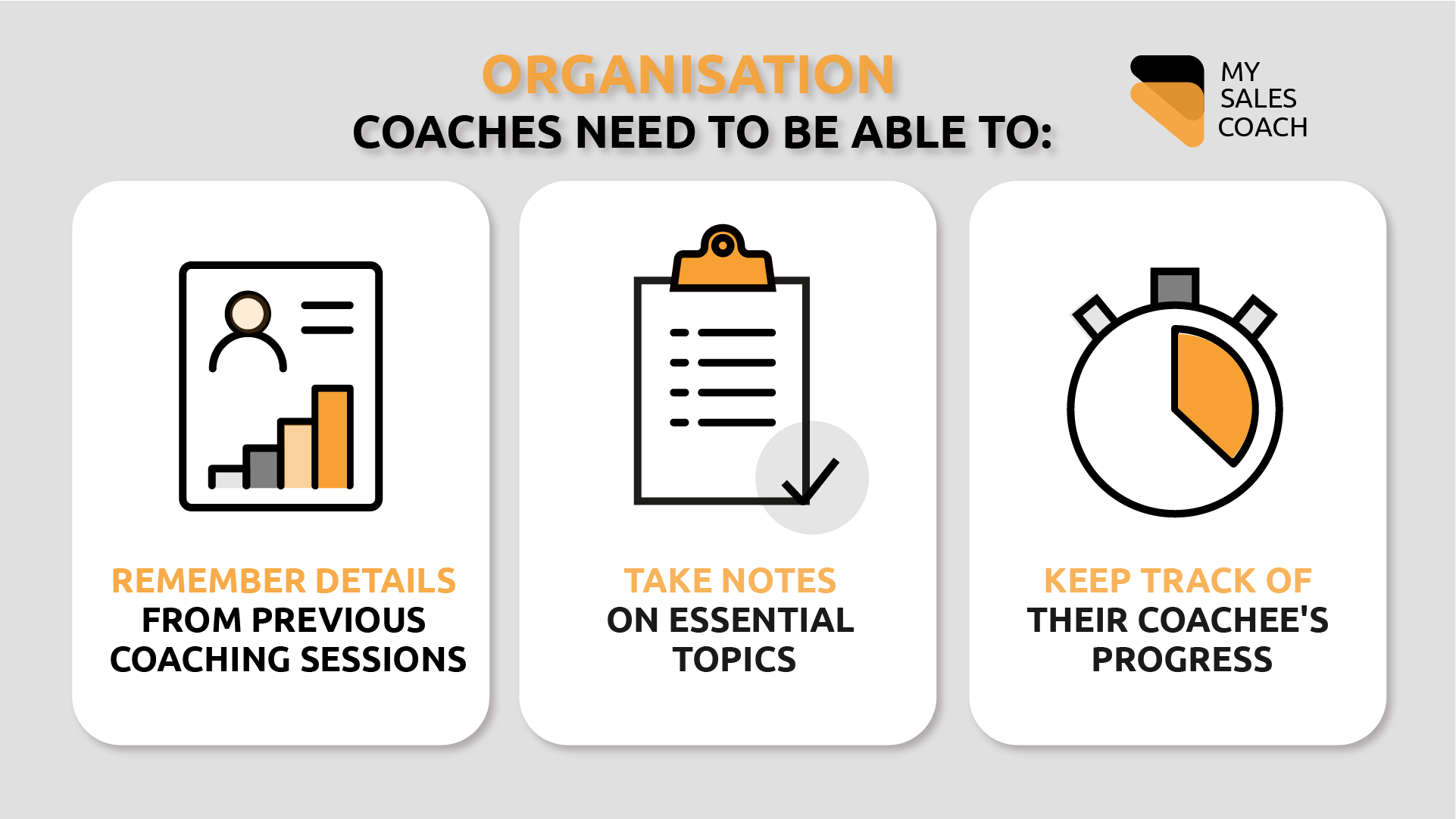Every successful sales team needs a great sales coach to help reps reach their full potential. But what makes the best sales coach?
The best sales coaches are highly skilled in seven key areas:
- Empathy
- Active listening
- Organisation
- Trust-building
- Adaptability
- Disconnection from the outcome
- Dedication
In this article, we'll explore these fundamental attributes and share tips on becoming a top sales coach.
1. Empathy
Empathy means being able to put yourself in the coachee's shoes and see things from their perspective.
To do this effectively, coaches must:
- Take the time to understand their perspectives.
- Ask open-ended questions.
- Reflect back on what the coachee says.
When you show empathy, you build trust and rapport with the coachee, which can help them feel more comfortable opening up and sharing their challenges and goals with you.
2. Active listening
Active listening is a critical attribute for a great sales coach. It means:
- Being fully present
- Engaging with the coachee
- Showing them that you are genuinely interested in their thoughts, feelings and experiences
Coaches must also be able to pick up on verbal and non-verbal cues to truly understand what their coachee is trying to communicate. Often, what someone doesn't say can be just as important as what they do say.
A coach who is skilled in active listening makes their coachee feel heard and understood, building a foundation of trust and making the coaching relationship more effective. When you listen actively, you can better understand the coachee's needs and perspectives, and this can help you to guide them towards finding their own solutions.
3. Organisation
Another key attribute of a great sales coach is organisation. Top sales coaches are able to:
- Keep track of their coachee's progress
- Take notes on essential topics
- Remember details from previous coaching sessions

This requires strong organisational skills, including staying focused and managing time effectively. When a coach is well-organised, they can provide better support and guidance to their coachee, helping them stay on track to achieve their goals.
4. Trust building
The best sales coaches should act as a sounding board for their coachee.
When you become a sounding board, you help your coachee:
- Explore and clarify their thoughts and ideas
- Reflect on their experiences
- Question their beliefs
- Understand their goals and what they need to do to achieve them
- Identify any limiting beliefs that may hold them back and work to overcome them
It's not about having all the answers or dictating the right way to do things. Rather, you empower the coachee to discover their own solutions and grow as a sales professional.
Prioritise building trust and establishing a solid relationship with your coachee. Create a safe, non-judgmental space for the coachee to share their thoughts and ideas. Be available and responsive to their needs. When you put the coachee's needs first and foster a supportive coaching environment, you help your coachee achieve their full potential and succeed in their goals.
5. Adaptability
A great sales coach needs to be adaptable. Sales professionals can come from a wide variety of backgrounds and may have vastly different needs and preferences when it comes to coaching.
A coach who is adaptable can tailor their coaching style to suit each individual coachee, providing personalised guidance and support.
You need strong communication skills, as well as the ability to think on your feet and adjust your approach as needed. When you’re adaptable, you help your coachee feel more engaged and invested in the coaching process, ultimately leading to better results.
6. Disconnection from the outcome
A good coach shifts their focus from achieving a specific outcome in favour of supporting and understanding their coachee.
This means that instead of setting predetermined goals or targets, coaches should encourage their coachees to explore their own ideas and solutions, and work with them to develop a realistic and achievable plan.
7. Dedication
Finally, to develop your coaching skills, it's important to actively seek out coaching opportunities.
Look for ways to help others grow and develop in your personal and professional life. This might mean volunteering to mentor a junior colleague, or offering to coach a friend or family member. By taking an active approach to honing your coaching skills, you can improve your abilities over time and become a more effective sales coach.
Now you know the seven attributes you need to possess to become a great sales coach, are you ready to start building those skills?
It takes time, practice, patience and dedication, but by honing these seven attributes, you’ll become a more effective sales coach and, most importantly, help your coachees fulfil their potential.
Are you ready to ignite your sales team's performance through coaching?
With MySalesCoach, your team have access to a roster of the best sales coaches across the world - each expert in coaching different roles and individuals on tactics, skills, sales behaviours and improving mindset.
Check out our expert sales coaches here.



